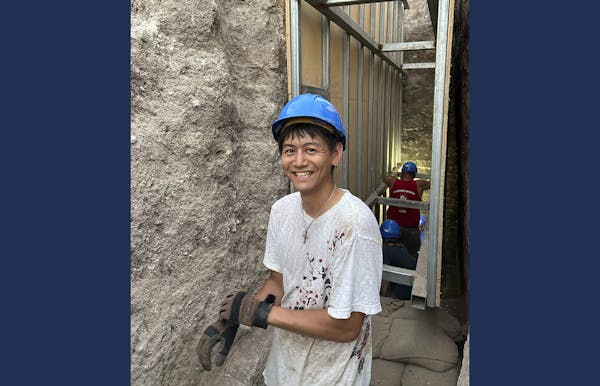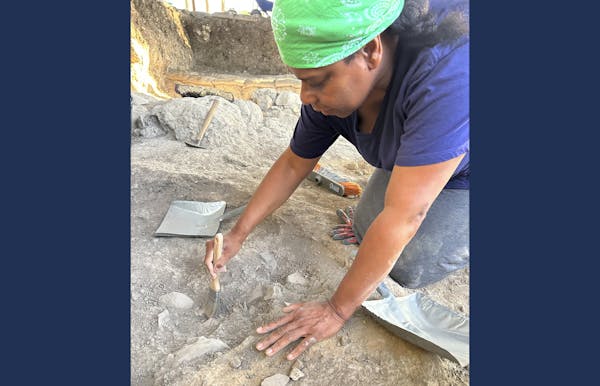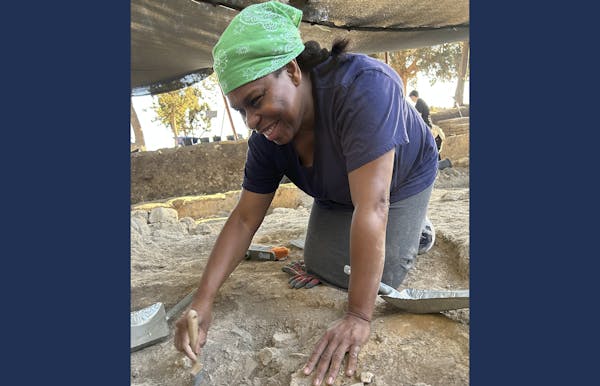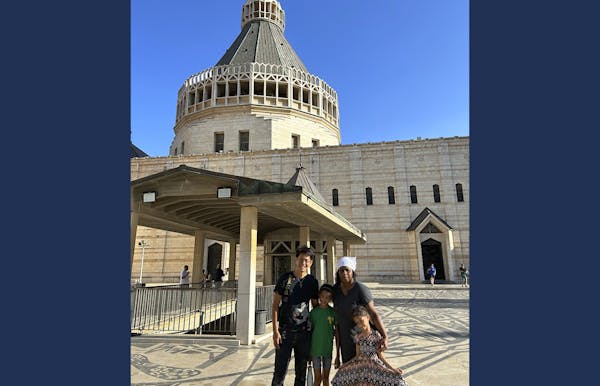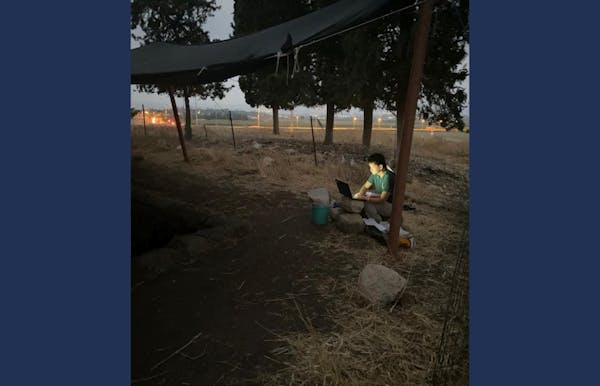Professor Kaz Hayashi and Tarsha Sylvester S’25 reflect on experience at a prominent archaeological dig
By Monique Kleinhuizen '08, GS'16, contributing writer
March 27, 2024 | 9 a.m.

Professor Kaz Hayashi at Tel Shimron Archaeological Dig Site, Summer 2023
Associate Professor of Old Testament Kazuyuki “Kaz” Hayashi remembers a moment of frustration early on in his education. Spirituality and study of the Bible tend to be subjective, he noticed.
“You just gotta feel it, man,” seemed to be the prevailing approach to things of faith. But as the son of a Japanese scientist, he was always attracted to understanding biblical texts in a more tangible way. “There has to be something more concrete,” he thought to himself.
He felt a call toward vocational ministry—and specifically academia—and began seeking out degrees, experiences, and relationships that would give him a more well-rounded perspective on the cultural and historical dynamics at play in Scripture. Since 2017, he’s been a staff member at Tel Shimron Excavations, a nonprofit archaeological organization and dig site in the Jezreel Valley in Northern Israel. Supported by donors and sponsors—including several foundations and universities—the project has just completed its eighth season of excavation and has 40 staff members from a variety of countries and academic disciplines.
The team includes botanists and geologists, Egyptologists, and microarchaeologists integrating scientific study of artifacts at a cellular level. Osteologists focus on human remains. Academics aside, there are atheists and agnostics in the group, as well as Jewish scholars, Catholics, and Protestants from all around the world. During regular, weeks-long dig sessions, they share their expertise with one another, taking turns teaching nightly lectures. They’ve built a diverse academic community built on respect, curiosity, and a desire to preserve and share important archaeological finds with the world.
“It’s an important, and very unique, site—the largest archaeological site in the Jezreel Valley. It’s been continually inhabited, from the Neolithic Period to the Middle Bronze Age to the Iron Age to the Roman Period of Jesus’ time to the Islamic Period to now. That’s 8,000 years of human history in one 50-acre space,” Hayashi explains.
As a field archaeologist and square supervisor, Hayashi travels to the site each summer to oversee a 100-square meter dig area, training volunteers from around the world and directing operations day-to-day. Last year, he created an elective Bethel Seminary course—The World and Culture of the Bible—based on the excavation experience. He wanted students to gain a deeper understanding of the geography, history, and culture of Israel through direct participation at Tel Shimron. Master of Divinity student Tarsha Sylvester ’25—one of Hayashi’s academic advisees—jumped on the opportunity.
“You want to get to Israel because that’s where it all began, where it all happened. But then there’s life, and the expense, and working full-time,” Sylvester says, recalling the internal turmoil she felt over her interest in the trip, but the six-week commitment it would take. “The Lord worked it all out! Culturally, spiritually, there were so many different worldviews coming together. Christians, Jews, Muslims, that’s everybody’s home.”
Donor funding through Bethel Seminary's Israel/Middle East Faculty Fellowship and the Israel Summer Project Seminary Student Scholarship is available to help make trips like this more financially accessible.
Loading Gallery...
This year, the team at Tel Shimron made a historic discovery of a massive, 15-foot-tall arched gate made of 9,000 bricks at the acropolis (top) of the tel (hill). The structure is the first and earliest discovery of a corbelled vault found in excavations from Israel—and it’s an extremely rare finding dating to the Bronze Age. It was featured in top Israeli media outlets.
“Seeing it uncovered was amazing. Usually we find foundations of buildings, but to find something that’s taller than a one-story house is really unbelievable. And the level of preservation is incredible. It’s mud brick, so if it rains, it melts!” says Hayashi. The team is in the process of documenting and preserving the site, backfilling it and adding supports for future visitors’ safety. For Hayashi, this was just one experience in a long line of them he’s had at Tel Shimron—and it all points back to his love for biblical archaeology that began as an undergraduate student.
— Professor of Old Testament Kaz Hayashi
Sylvester came away with similar reactions—both to the excavation itself, and also to the group of people surrounding it.
“There were so many languages. It was truly the Tower of Babel. And it was this amazing tactile experience to see centuries of history piled up in the dirt,” she says, explaining how she roomed with two Chinese women during the dig—one an atheist. The experience led to profound conversations about faith and worldview, and she now considers them friends.
— Tarsha Sylvester S’25
Deepen your understanding of the Bible at Bethel Seminary
In a rapidly changing world, ministry leaders must be grounded in truth, with unshakable faith and agile leadership skills. So Bethel Seminary provides holistic training that first transforms you, then equips you to transform others. Here, you’ll be challenged and changed—so you’ll be ready to change the world.
